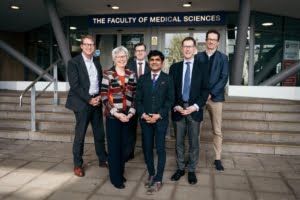
Dr Stineke van Houte became a Lister Prize Fellow in 2021. We sat down with her to find out what it was like to apply for – and win – the Prize as a new parent and during a global pandemic.
Stineke won the Lister Prize on her first application, after her Director of Research suggested she apply. At the time, although she knew that the Lister aims to fund early-career researchers, it felt very much like a “long shot.”
“I’d only started my own independent group 18 months before the application deadline, but more importantly I was on maternity leave with twin babies at home – all while the COVID-19 pandemic was wreaking havoc.”
“But,” she says, “it helped that the application form is simple and straightforward – unlike many other funding application schemes.”
Stineke is based at the beautiful, Cornish Penryn Campus at the University of Exeter. The lab’s focus lies in the vital and urgent search for alternatives to antibiotics. We were lucky enough to hear from Stineke at our AGM back in September, at which she described antimicrobial resistance as a “slow-spreading global pandemic.”
The van Houte lab is using CRISPR-Cas9 technology as a mobile antimicrobial tool in microbial communities, such as those in the gut, to remove or prevent the uptake of antibiotic resistance genes. This ongoing research demonstrates that inserting CRISPR-Cas9 into plasmids re-sensitises a range of bacteria to antibiotics. They are seeking out the best “phage cocktail” for getting plasmids into bacteria, engineering plasmids, measuring their effectiveness in gut cells, and creating an in vivo model of preventing infection, working towards a clinical use. This work could have profound implications for human health.
Stineke is using the Lister funding to fund two positions in her lab – an “amazing” former PhD student who is now a postdoc, and a “very enthusiastic, skilled and hard-working junior researcher from Spain.” Both are using the lab’s new antimicrobial tools in pathogenic E. coli strains and making excellent progress.
We wish Stineke and her team all the best for their ongoing research.
You can find out more about the lab’s work on their website.



